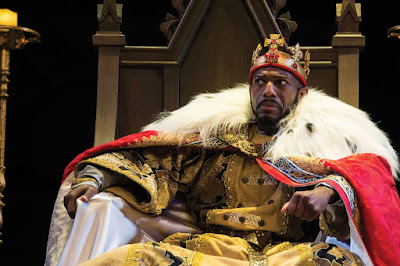What an odd little play.
First up, we'll need to address how John was held in the imagination of the Elizabethan era, which is somewhat different from how we view him today. Thanks to Scott's Ivanhoe and Disney's thumb-sucking, scrawny lion whose stolen crown doesn't fit on his head, we picture John as a whiny and ineffectual regent for Richard the Lionheart, who was all things bold and courageous and who came home to support the hero Robin Hood.
Not so - there's no connection with John and Robin Hood until the literature of the 19th century, and Richard I was, frankly, a terrible king. He would have sold his own liver for a chance at a battle, any battle, and certainly would have auctioned off anyone else's. He butchered his own people in France (remember he was king of both England AND half of what we now know as France,) and he spent most of his reign leaving the administration of his affairs to others, among them his little brother John.
It's hard to say why Richard was viewed, even in Shakespeare's time, with such adoration. But John wasn't hated nearly as much, except by many of the nobility, who resented his taxation and his attempt at curtailing their powers (hence the Magna Carta, which is completely ignored in the play.) And yet John is certainly viewed with distaste, as a man who can't quite come out and say what he means. He can't bring himself to tell Hubert directly to murder young Arthur, his brother Geffrey's son and a threat to his crown, so he hints around it, later berating Hubert for taking his hints when Arthur's death is taken so ill by his nobles that they abandon him. And he promises much advancement to the Bastard Faulconbridge, though never in concrete terms, which prove illusory by the end of the play.
 |
| Corey Jones in the title role at the 2013 Utah Shakespeare Festival. |
John was the youngest of four brothers to survive to adulthood, and was unlikely to ever become king, except he was born into the most warlike family known to man. His mother, Eleanor of Aquitaine, was married to two kings, and makes an appearance as a sly, manipulative, yet powerful granddam in Shakespeare's play. His father was known for his temper tantrums and refusal to bow to the power of the church, ending in the murder of Thomas a Becket at the altar of Canterbury Cathedral.
 |
| A 1597 portrait of King John by an unknown artist. While the portrait was completed many years after John's death, it shows how an artist in Shakespeare's era would have pictured him. |
The truth is, the more that you read about medieval monarchies, the more you realize that the myth of primogeniture is just that - a myth. It was rare for more than two or three generations to remain stable on the throne based on inheritance of the eldest son. So what do you do? You marry your daughter to another prince of a nearby territory and hope their oldest son, your grandchild, will inherit both.
And this is where we end up early on in "King John" - England's king makes a deal with France's to combine their forces against Arthur's, using marriage between their youth to strike a deal. But the deal itself is not just against Arthur - both kings are thwarted in their attempts to enter the city of Angiers, which is barred against all comers and refuses to open to any but the true king.
But who is the true king? Both King John and King Philip of France claim it for themselves. When asked "Speak, citizens, for England; who's your king?" the citizens reply with "The king of England; when we know the king." When both kings try to claim the crown, the reply from the citizenry is:
"A greater power then we denies all this;The citizens await the decision to be made before they will open their gates. They have the ability to add their power to one claim or another, and thereby strengthen that claim, but abstain instead. They want certainty, to only open their gates to whoever God (and brute force) claims as king. But by abdicating responsibility, they leave themselves open to the whims of fate. Who is to say that the winning king will be a good one? Could they not have assured the victory of a better king by getting involved? And yet they seem stymied by the choice, unable to decide, and so refuse to engage at all.
And till it be undoubted, we do lock
Our former scruple in our strong-barr'd gates;
King'd of our fears, until our fears, resolved,
Be by some certain king purged and deposed." (II.i.)
 |
| Tim Sailer plays the title character in Texas Shakespeare Festival’s “King John," 2018. |
Eventually, the citizenry are the ones who make the suggestion for the two kings to join their forces by marriage of the next generation (Blanche and Lewis.) They solve the problem through negotiation rather than force. And this seems to be the new paradigm - war by commerce and parley rather than sword and cannon. The Bastard in particular seems disgusted by the realpolitik of it all, but he is the illegitimate son of the Lionheart, after all, so battle is in his blood.
From the balcony, the play seems to be about indecision and uncertainty, and what happens when no strong, legitimate hand emerges to rule. In that case, do we sit back and wait to see who is victorious, as do the citizens of Angiers? Or are we right to try to find new answers when the old ways no longer serve us?


No comments:
Post a Comment